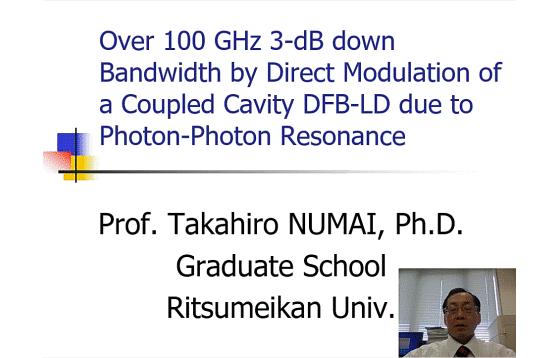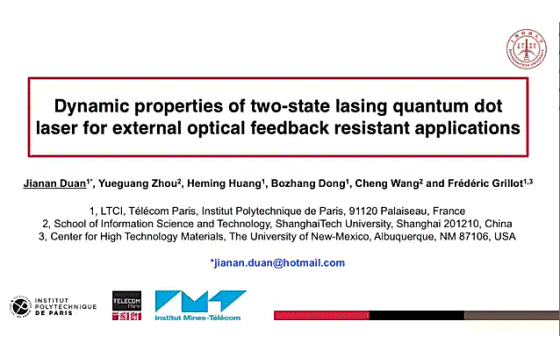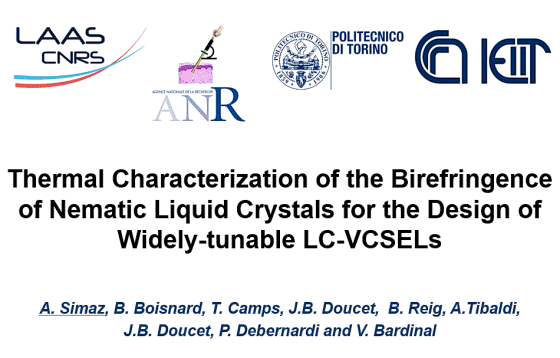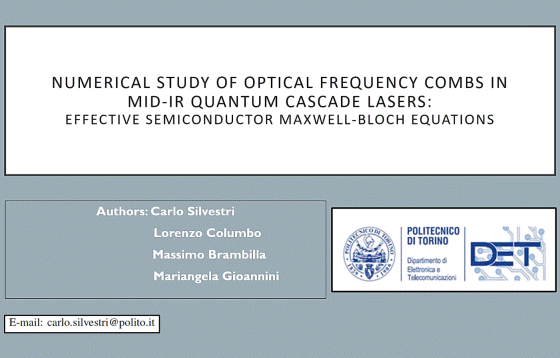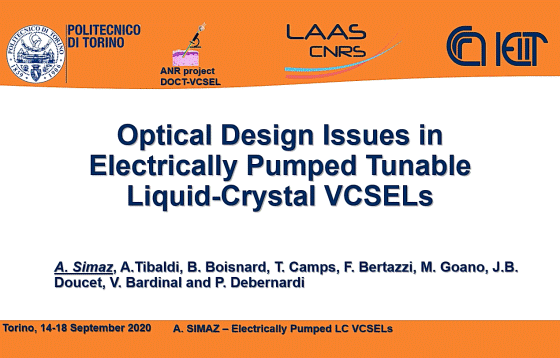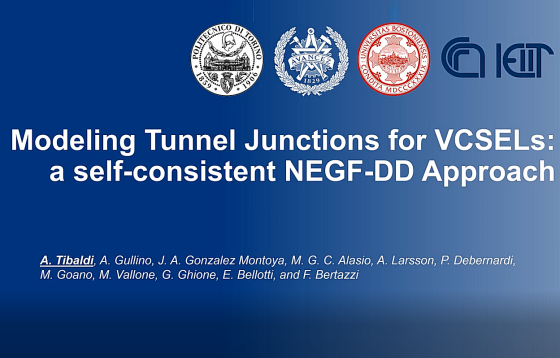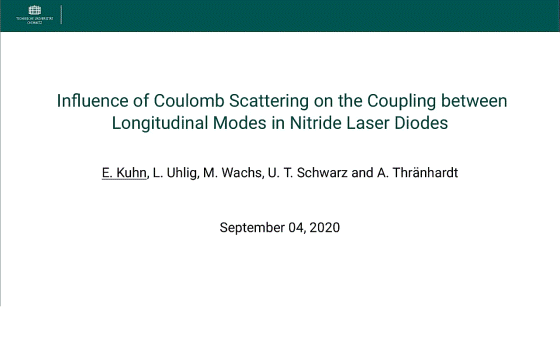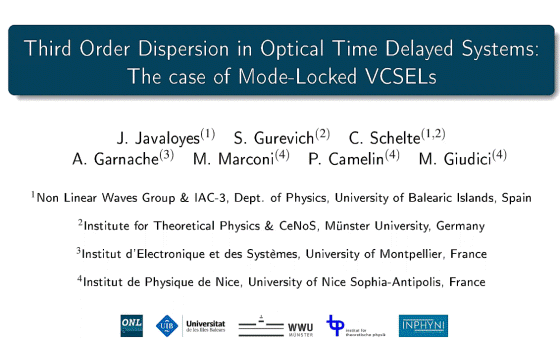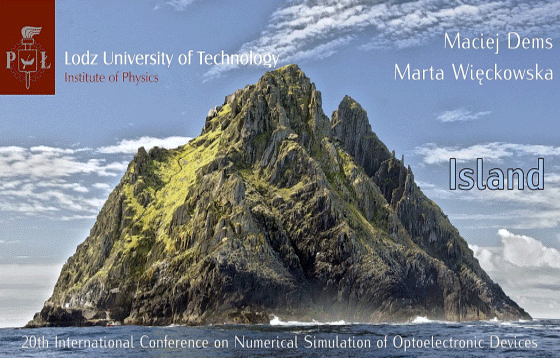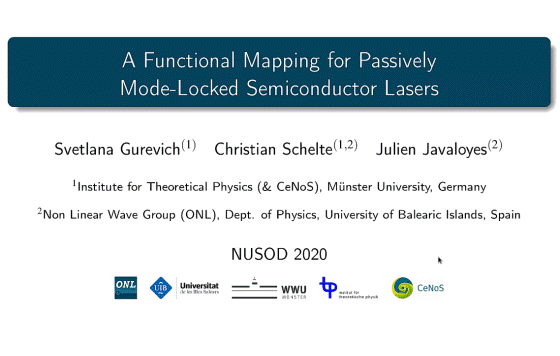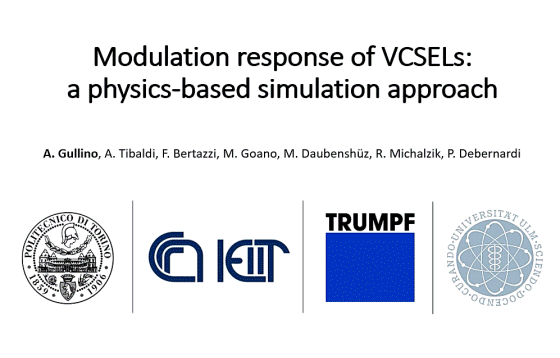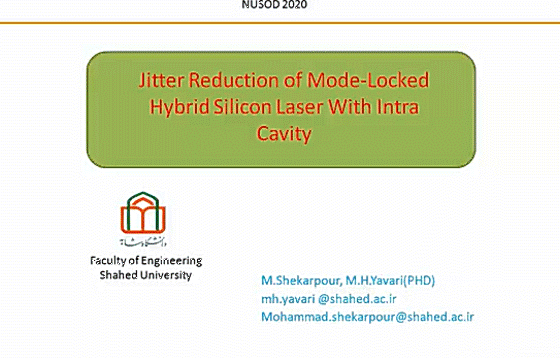Laser Diodes12 Posts



This paper reports on 3-dB down bandwidth of 110.6 GHz by direct modulation of a coupled cavity DFB-LD with phase-shifted/uniform gratings due to photon-photon resonance when the injected current is 3.5 times the threshold current.
LD10–Dynamic properties of two-state lasing quantum dot laser for external optical feedback resistant applications
This work investigates the dynamics of two-state quantum dot lasers through semi-analytically solving a set of rate equations. Simulations reveal that the occurrence of excited state lasing reduces the damping factor of the laser while increases the linewidth enhancement factor associated to the ground state transition. These results are in good agreement with the experimental […]
LD07–Thermal Characterization of the Birefringence of Nematic Liquid Crystals for the Design of Widely-tunable LC-VCSELs
In this work, the thermo-optical properties of nematic liquid crystals are investigated through localized reflectance spectra measurements performed on a tunable LC-filter. The final aim is to insert such LC in the cavity of a tunable VCSEL device, in which local self-heating due to optical or electrical pumping must be taken into account. We demonstrate […]
LD06–Numerical Study of Optical Frequency Combs in mid-IR Quantum Cascade Lasers: Effective Semiconductor Maxwell-Bloch Equations
In this paper a theoretical model based on Effective Semiconductor Maxwell-Bloch Equations (ESMBEs) is proposed for the description of the dynamics of a multi-mode mid-Infrared (mid-IR) Quantum Cascade Laser (QCL) in Fabry Perot (FP) configuration, in order to investigate the spontaneous generation of frequency combs in this device. In agreement with recent experimental results our […]
LD05–Optical Design Issues in Electrically Pumped Tunable Liquid-Crystal VCSELs
In this work we investigate a tunable 850nm laser based on a hybrid combination of a liquid crystal micro-cell and a half GaAs VCSEL. The target application is optical coherence tomography. The inherent tolerances of the hybrid technology, the presence of metals in the cavity and the need for a pure extraordinary mode lasing make […]
LD04–Modeling Tunnel Junctions for VCSELs: A Self-Consistent NEGF-DD Approach
In this work we investigate carrier transport in tunnel junctions for vertical-cavity surface-emitting lasers by a novel self-consistent simulation framework for semiconductor quantum devices. Based on a Poisson-drift-diffusion foundation, in this approach quantum features are described through a nonequilibrium Green’s function formalism. The simulator is validated through a comparison with experimental results.
LD11–Influence of Coulomb Scattering on the Coupling between Longitudinal Modes in Nitride Laser Diodes
Due to their small separation of longitudinal modes, Fabry-Perot type laser diodes show rich mode competition effects. For example streak camera measurements show cyclic mode hopping, where the currently active longitudinal mode changes from lower to higher wavelengths. This effect can be explained by beating vibrations of the carrier densities in the quantum wells and […]
LD01–Third Order Dispersion in Optical Time Delayed Systems: The case of Mode-Locked Vertical External-Cavity Surface-Emitting Lasers
Time-delayed dynamical systems materialize in situations where distant, point-wise, nonlinear nodes exchange information that propagates at a finite speed. However, they are considered devoid of dispersive effects, which are known to play a leading role in pattern formation and wave dynamics. We show how dispersion may appear naturally in delayed systems and we exemplify our […]
LD12–Modeling Impact of Oxide Island on the Lasing of ARROW-VCSEL
We analyze the impact of a low-refractive antiresonant oxide island buried in a top VCSEL mirror on the lasing conditions of lateral modes of different orders. By performing comprehensive thermal, electrical, and optical numerical analysis of the VCSEL device, we show the impact of the size and location of the oxide island on the current […]
LD02–A Functional Mapping for Passively Mode-Locked Semiconductor Lasers
We present a modern approach for the analysis of passively mode-locked semiconductor lasers that allows for efficient parameter sweeps and time jitter analysis. It permits accessing the ultra-low repetition rate regime where pulses become localized states. The analysis including slow (e.g. thermal) processes or transverse, diffractive dynamics becomes feasible. Our method bridges the divide between […]
LD03–Modulation response of VCSELs: a physics-based simulation approach
A preliminary study of the dynamic behaviour of a GaAs/AlGaAs 850 nm VCSEL is presented, with the focus on the small-signal analysis and in particular on the optical amplitude modulation response. Simulations are performed with our in-house quantum-corrected one-dimensional drift-diffusion code D1ANA, updated to perform the AC analysis. The -3 dB cutoff frequency of the […]
LD08–Jitter Reduction of Mode-Locked Hybrid Silicon Laser With Intra Cavity Filter
We study the influence of the intra-cavity ring on dynamics, phase noise and timing jitter of a long-ring-cavity colliding pulse mode-locked laser using a delay differential equation (DDE) model. The results of dynamic show that the intra-cavity filter can suppress harmonics of 2 GHz cavity. We also find a reduction of phase noise and timing […]

